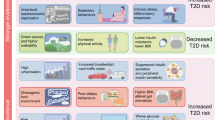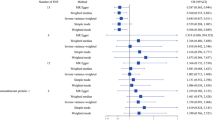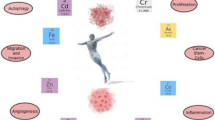Abstract
Background
Environmental tobacco smoke (ETS) is the primary etiologic factor responsible for lung cancer. However, only 10–15 % of smokers develop lung cancer, suggesting a genetic role in modifying individual susceptibility to lung cancer. Antioxidant enzymes and genetic polymorphisms should be considered.
Aim
The present study aimed to evaluate the role of antioxidant enzyme activity and genetic polymorphisms in modifying the susceptibility to lung cancer among individuals exposed to ETS.
Subjects and Methods
A total of 150 male subjects were divided into three groups: 50 lung cancer patients, 50 chronic smokers, and 50 passive smokers. Genotyping of microsomal epoxide hydrolase (mEH) exon 3 (Tyr113Hist) and exon 4 (Hist139Arg) polymorphisms were done by the polymerase chain reaction-restriction fragment length polymorphism technique. MnSOD (Val16Ala) polymorphism was detected by the real time-TaqMan assay. Erythrocyte MnSOD activity was measured spectrophotometrically.
Results
ETS-exposed individuals (both active and passive smokers) who carried the His allele of mEH exon3 have a 2.9-fold increased risk of lung cancer (odds ratio [OR] 2.9, P < 0.001). In addition, ETS-exposed carriers of the Arg allele of mEH exon 4 have a 2.1-fold increased risk of lung cancer (OR 2.1, P = 0.024). However, no association between the MnSOD Val16Ala polymorphism and lung cancer was detected among ETS-exposed individuals (OR 1.6, P = 0.147), although the lung cancer group had significantly lower MnSOD activity than the chronic or passive smoker groups (P = 0.03).
Conclusions
Exons 3 and 4 polymorphisms of the mEH gene may contribute to lung cancer susceptibility through disturbed antioxidant balance. However, this was not the case with the MnSOD Val16Ala single-nucleotid polymorphism. Antioxidant enzymes may modulate the influence of ETS exposure on lung cancer risk.



Similar content being viewed by others
References
Eldridge L. Secondhand smoke and lung cancer, About.com guide; Medical Review Board. Updated September 20, 2012. http://lungcancer.about.com/od/causesoflungcance1.htm, Viewed on November 21, 2012.
Horn L, Pao W, Johnson DH. Harrison’s principles of internal medicine. 18th ed. McGraw-Hill; 2012. (89). ISBN 0-07-174889-X.
Spitz MR, Wei Q, Dong Q, Amos CI, Wu X. Genetic susceptibility to lung cancer: the role of DNA damage and repair. Cancer Epidemiol Biomark Prev. 2003;12:689–98.
Wang S, Zhu J, Zhang R, Wang S, Gu Z. Association between microsomal epoxide hydrolase 1 T113C polymorphism and susceptibility to lung cancer. Tumor Biol. 2013. ISSN: 1423-0380.
Jaganjac M, Cacev T, Cipak A, Kapitanovic S, Troselj KG, Zarkovic N. Even stressed cells are individuals: second messengers of free radicals in pathophysiology of cancer. Croat Med J. 2012;53:304–9.
Decke M, Arand M, Cronin A. Mammalian epoxide hydrolases in xenobiotic metabolism and signalling. Arch Toxicol. 2009;83:297–318.
Zhang JH, Jin X, Li Y, Wang R, Guo W, Wang N, Wen DG, Chen ZF, Kuang G, Wei LZ, Wang SJ. Epoxide hydrolase Tyr113His polymorphism is not associated with susceptibility to esophageal squamous cell carcinoma in population of North China. World J Gastroenterol. 2003;9:2654–7.
Kamal MA, Elsaadany ZA, Fouad NB, Elaal AA, Makhlouf MM, Shabaan MM, Elrahman DR. Genetic polymorphism of microsomal epoxide hydrolase enzyme gene in pre-eclamptic females. Am J Med Sci. 2012;343(4):291–4.
Park JY, Chen L, Elahi A, Lazarus P, Tockman MS. Genetic analysis of microsomal epoxide hydrolase gene and its association with lung cancer risk. Eur J Cancer Prev. 2005;14:223–30.
Pinarbasi H, Silig Y, Pinarbasi E. Microsomal epoxide hydrolase polymorphisms. Mol Med Reports. 2010;3:723–7.
Martin RCG, Li Y, Liu Q, Barker DF, Doll MA, Hein DW. Manganese superoxide dismutase expression as a function of genotype and lung cancer pathology. Cancer Invest. 2010;28(8):813–9.
Choi JY, Neuhouser ML, Barnett M, Hong CC, Kristal AR, Thornquist MD, King IB, Goodman GE, Ambrosone CB. Iron intake, oxidative stress-related genes (MnSOD and MPO), and prostate cancer risk in CARET cohort. Carcinogenesis. 2008;29:964–70.
Sutton A, Imbert A, Igoudjil A, Descatoire V, Cazanave S, Pessayre D, Degoul F. The manganese superoxide dismutase Ala16Val dimorphism modulates both mitochondrial import and mRNA stability. Pharmacogenet Genomics. 2005;15:311–9.
Miao L, Daret K. Regulation of superoxide dismutase genes: implications in diseases. Free Radic Biol Med. 2009;47(4):344–56.
Adcock IM, Caramori G, Barnesa P. Chronic obstructive pulmonary disease and lung cancer: new molecular insights. Respiration. 2011;81:265–84.
Margaret AL, Syahruddin E, Wanandi SI. Manganese superoxide dismutase in lung cancer patients with a smoking history. Asian Pac J Cancer Prev. 2011;12:3049–53.
National Cancer Institute. National Cancer Institute definition of pack year. NCI dictionary of cancer terms. 2013. http://www.cancer.gov/dictionary?CdrID=306510. Accessed 30 April 2013.
Boom R, Sol CJ, Salimans MM, Jansen CL, Wertheim-van Dillen PM, van der Noordaa J. Rapid and simple method for purification of nucleic acids. J Clin Microbiol. 1990;28(3):495–503.
Cheng SL, Yu CJ, Chen CJ, Yang PC. Genetic polymorphism of epoxide hydrolase and glutathione S-transferase in COPD. Eur Respir J. 2004;23:818–24.
Smith CAD, Harrison DJ. Association between polymorphism in gene for microsomal epoxide hydrolase and susceptibility to emphysema. Lancet. 1997;350:630–3.
Hovink T, Dolzan V, Bratina N, Podrajsek KT, Battellino T. Genetic polymorphisms in genes encoding antioxidant enzymes are associated with diabetic retinopathy in type 1 diabetes. Diabetes Care. 2009;32(12):2258–65.
Kang J, Koo S, Kwon K, Park J. Frequent silence of chromosome 9p, homozygous dock8, dmrt1 and dmrt3 deletion at 9 in squamous cell carcinoma of the lung. Int J Oncol. 2012;37(24):327–35.
Tilak AR, Kumar S, Jain M, Pant MC, Das BC, Guleria R, Mittal B, Mathur N, Kumar A. Association of functionally important polymorphism of microsomal epoxide hydrolase gene (EPHX1) with lung cancer susceptibility. Cancer Invest. 2011;29(6):411–8.
Erkisi Z, Yaylim-Eraltan I, Turna A, Görmüs U, Camlica H, Isbir H. Polymorphisms in the microsomal epoxide hydrolase gene: role in lung cancer susceptibility and prognosis. Tumori. 2010;96:756–63.
Gsur A, Zidek T, Schnattinger K, Feik E, Haidinger G, Hollaus P, Mohn-Staudner A, Armbruster C, Madersbacher S, Schatzl G, Trieb K, Vutuc C, Micksche M. Association of microsomal epoxide hydrolase polymorphisms and lung cancer risk. Br J Cancer. 2003;89:702–6.
Kiyohara C, Yoshimasu K, Takayama K, Nakanishi Y. EPHX1 polymorphisms and the risk of lung cancer: a huge review. Epidemiology. 2006;17:89–99.
Li X, Hu Z, Qu X, Zhu J, Li L, Ring BZ, Su L. Putative EPHX1 enzyme activity is related with risk of lung and upper aerodigestive tract cancers: a comprehensive meta-analysis. PLoS ONE. 2011;6(3):e14749.
Liu H, Li HY, Chen HJ, Huang YJ, Zhang S, Wang J. EPHX1 A139G polymorphism and lung cancer risk: a meta-analysis. Tumor Biol. 2013;34(1):155–63.
Bartsch H, Nair U, Risch A, Rojas M, Wikman H, Alexandrov K. Genetic polymorphism of CYP genes, alone or in combination, as a risk modifier of tobacco-related cancers. Cancer Epidemiol Biomark Prev. 2000;9:3–28.
Petruzzelli S, Camus AM, Carozzi L, Ghelarducci L, Rindi M, Menconi G, Angeletti CA, Ahotupa M, Hietanen E, Aitio A, Saracci R, Bartsch H, Giuntini C. Long-lasting effects of tobacco smoking on pulmonary drug-metabolizing enzymes: a case control study on lung cancer patients. Cancer Res. 1988;48:4695–700.
Habalova V, Salagovic J, Kalina I, Stubna J. Combined analysis of polymorphisms in glutathione S-transferase M1 and microsomal epoxide hydrolase in lung cancer patients. Neoplasma. 2004;51:352–7.
Ho JC, Mak JC, Ho SP, Ip MS, Tsang KW, Lam WK, Chan-Yeung M. Manganese superoxide dismutase and catalase genetic polymorphisms, activity levels, and lung cancer risk in Chinese in Hong Kong. J Thorac Oncol. 2006;1(7):648–53.
Bag A, Bag N. Target sequence polymorphism of human MnSOD gene and its association with cancer risk: a review. Cancer Epidemiol Biomark Prev. 2008;17(12):3298–305.
Mao C, Qiu LX, Zhan P, Xue K, Ding H, Du FB, Li J, Chen Q. MnSOD Val16Ala polymorphism and prostate cancer susceptibility: a meta-analysis involving 8,962 subjects. J Cancer Res Clin Oncol. 2011;136(7):975–9.
Ho JC, Zheng S, Comhair SA, Farver C, Erzurum SC. Differential expression of manganese superoxide dismutase and catalase in lung cancer. Cancer Res. 2001;61:8578–85.
Sharma A, Rajappa M, Saxena A, Sharma M. Antioxidant status in advanced cervical cancer patients undergoing neoadjuvant chemoradiation. Br J Biomed Sci. 2007;64:23–7.
Pasupathi P, Saravanan G, Bakthavathsalam G. Effect of chronic smoking on erythrocyte lipid peroxidation and antioxidant status in gastric carcinoma patients. J Cell Tissue Res. 2008;8:1399–403.
Jain A, Agrawal BK, Varma M, Jadhav AA. Antioxidant status and smoking habits: relationship with diet. Singap Med J. 2009;50(6):624–7.
Gavali Y, Deore D, Surwase SP, Zingade U. Study of the serum superoxide dismutase levels in smoking and non-smoking patients with COPD. Int J Recent Trends Sci Technol. 2011;5(3):121–6.
Holley AK, Bakthavatchalu V, Velez-Roman JM, St Clair DK. Manganese superoxide dismutase: guardian of the powerhouse. Int J Mol Sci. 2011;12(10):7114–62.
Acknowledgments
This study was partially funded by the Faculty of Medicine, Cairo University by purchasing the kits of laboratory work. The entire work was independent of the funder.
Conflict of interest
The authors declare that they have no conflicts of interest that are directly relevant to the content of this article.
Author information
Authors and Affiliations
Corresponding author
Rights and permissions
About this article
Cite this article
Fathy, M., Hamed, M., Youssif, O. et al. Association Between Environmental Tobacco Smoke Exposure and Lung Cancer Susceptibility: Modification by Antioxidant Enzyme Genetic Polymorphisms. Mol Diagn Ther 18, 55–62 (2014). https://doi.org/10.1007/s40291-013-0051-6
Published:
Issue Date:
DOI: https://doi.org/10.1007/s40291-013-0051-6




